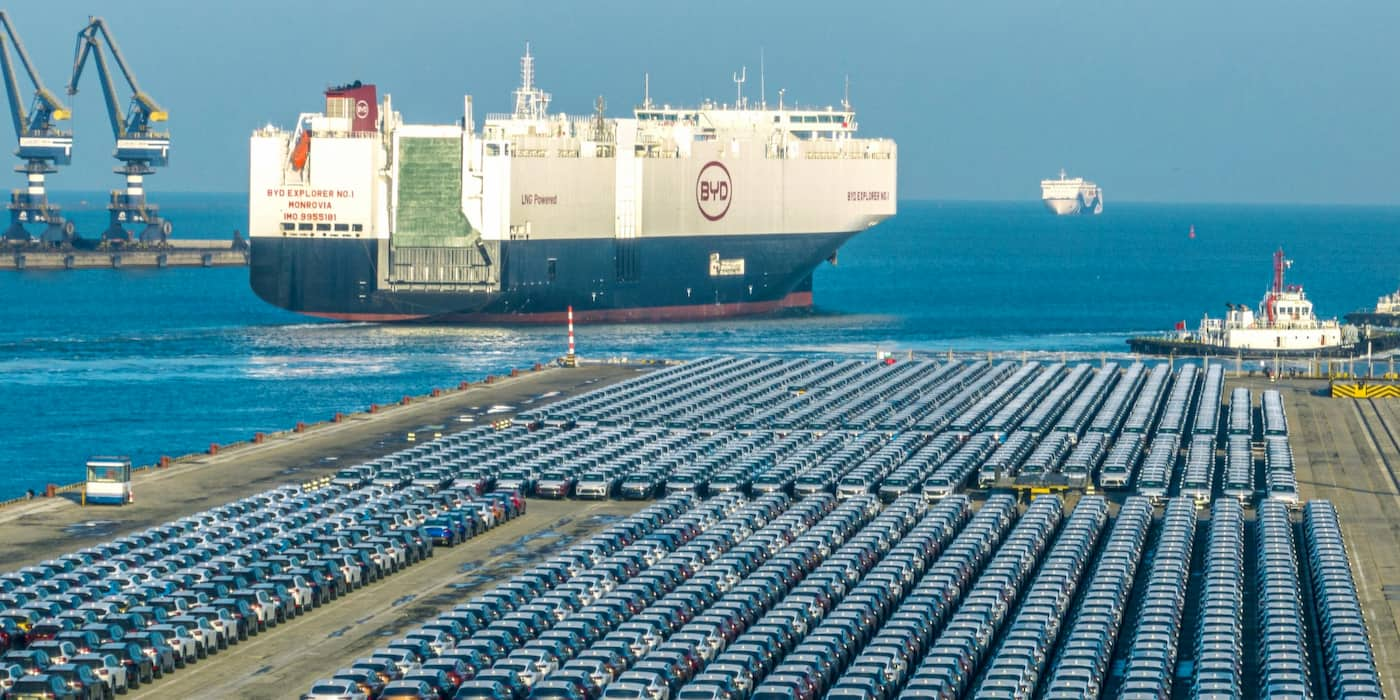
Chinese EV makers are looking to export electric vehicles by the tens of thousands around the globe, but they need a lot more car-carrying vessels to make that happen. Demand is so high that the country is on track to amass what will be the world’s fourth-largest fleet in a few short years, with new trade routes being created especially for Chinese EVs.
China now has the world’s eighth-largest shipping fleet with 33 car-carrying ships, according to data from shipping consultants Veson Nautical and reported by Reuters. By comparison, Japan tops the list with 284 ships, followed by Norway, which has 102. South Korea comes in third with 72 and the Isle of Man, which has 61 registered ships, in fourth.
Yet, the current state of affairs is rapidly changing, with Chinese companies putting 47 ships on order, which accounts for a quarter of all orders globally. Customers buying the ships include SAIC Motor, Chery, BYD, as well as shipping companies COSCO and China Merchants “on behalf of Chinese automakers,” reports Reuters.
“After this armada has been delivered to China, the Chinese controlled car carrier fleet will jump from current 2.4% to 8.7%,” Veson analyst Andrea de Luca told Reuters. “We expect to see new trade routes established almost exclusively for Chinese OEMs.”
China has already overtaken Japan as the world’s largest auto exporter, with BYD alone exporting more than 240,000 vehicles last year, making up about 80% of its global sales. This year, it plans to export up to 400,000 EVs. The EV giant already has one purpose-built 7,000-EV-capacity ship and plans to add seven more such vessels in two years.
Tesla and Volkswagen have also expanded their exports from China, which of course leverages the country’s cheaper supply chain to their advantage.
Cars are typically transported by sea using roll-on/roll-off (RORO) ships that allow vehicles to be driven directly on rather than using a crane. But these ships have been in short supply in recent years, with older vessels being retired and new ship orders down due to both the 2008 financial crisis and the industry upgrade to less-polluting fuels, reports MIT Technology Review.
In Japan, Nissan and Toyota each have fleets of RORO ships that can carry tens of thousands of cars, but for China, its domestic car-carrier vessels have represented a tiny portion of the global shipping capacity – only 2.8% – leaving Chinese companies few options for exporting their cars.
As a result, access to RORO ships has cost a fortune, with the daily rate to charter ships reaching $115,000 a day. That’s more than seven times higher than the price in 2019. So companies have turned to just buying the ship themselves.
Electrek’s Take
This is all happening as China is under scrutiny for what the European Commission says is unfairly subsidizing EVs exporting to Europe, with Washington keeping a close eye. For one, in China, the state subsidies paired with the economic slowdown have created a massive pileup of oversupply, with companies looking to export and clear out inventories. Hence, cheap EVs coming your way (well, not in the US, at least not yet anyway). Still, steep import tariffs await on European borders.
And let’s peek under the hood a bit too: Chinese President Xi “had accelerated an industrial drive centered on EVs, semiconductors and artificial intelligence and renewable energy” to try to compete with the US, China correspondent Lingling Wei told Reuters. But behind the scenes “is a struggling overall economy that many economists say could see even greater waste down the road because of the state-led industrial drive,” she said.
Not to mention, the shipping industry is currently facing its own carbon emissions reckoning and needs to radically decarbonize in the coming years to meet Paris climate goals. It’s currently sixth largest greenhouse gas emitter worldwide, which puts it between Japan and Germany, according to the World Bank. So moving EVs all over the world certainly comes at a price, environmentally, of course.
